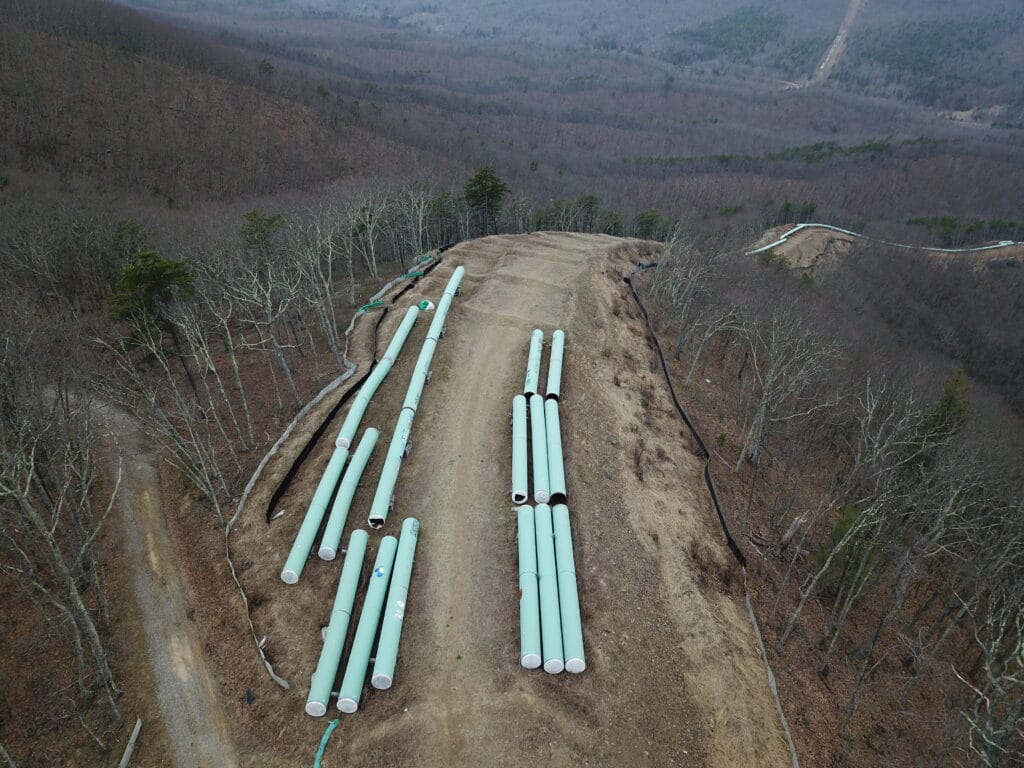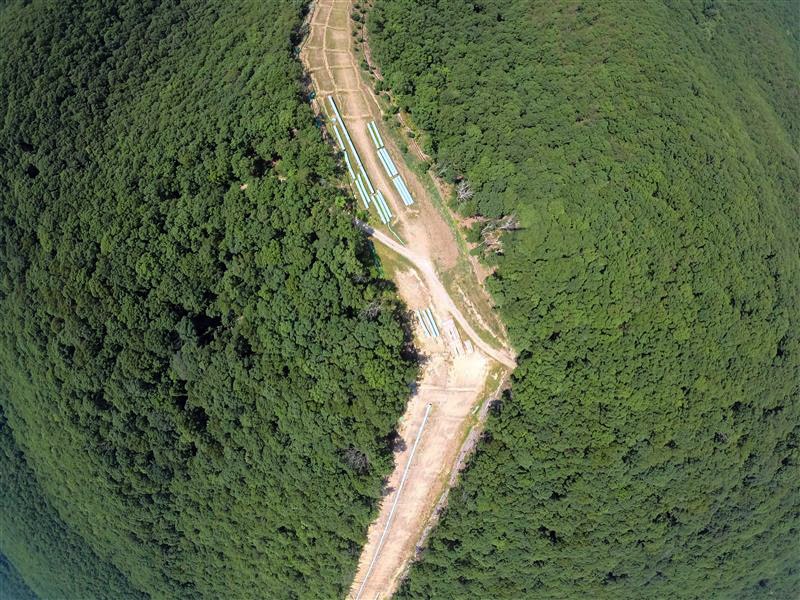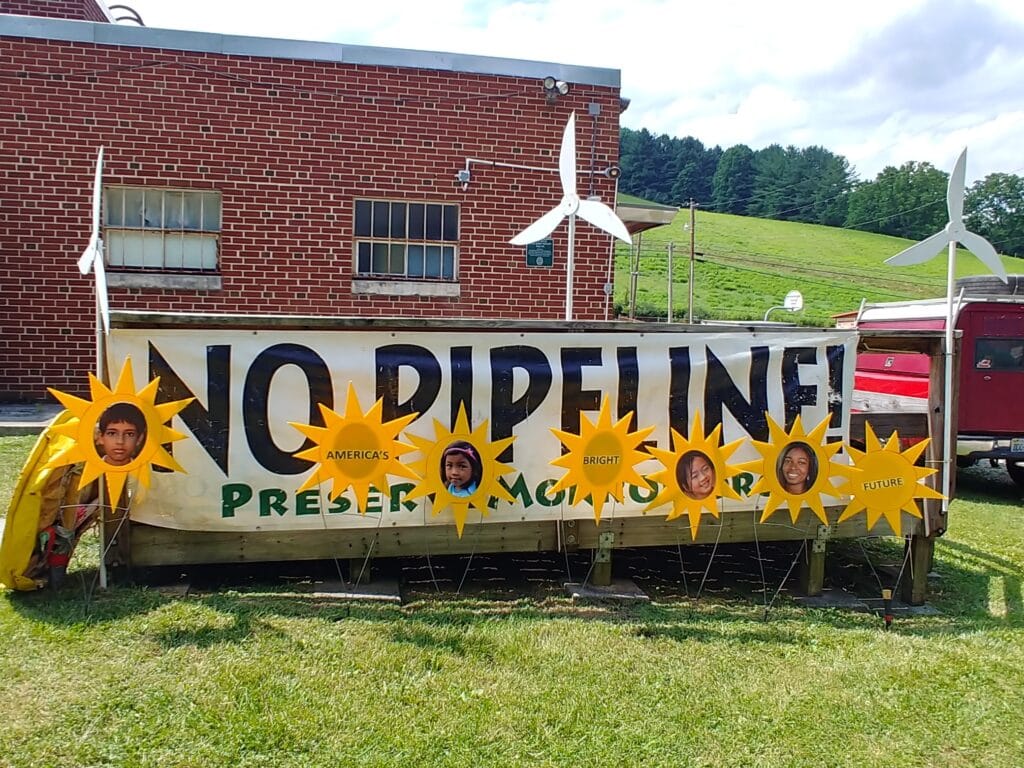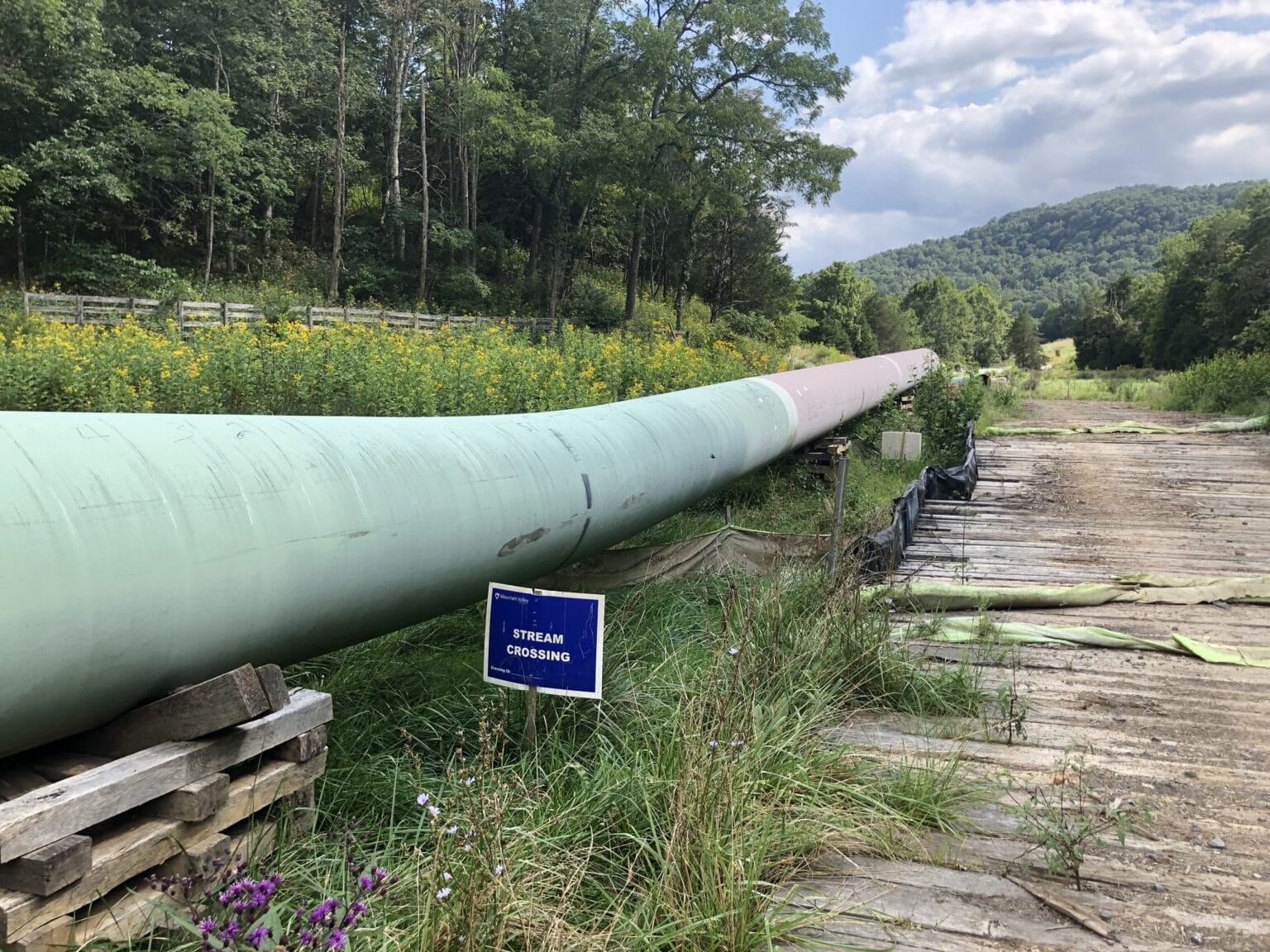The Environmental Protection Agency (EPA) is advising the Army Corps of Engineers not to grant a federal water permit to the Mountain Valley Pipeline due to “substantial concerns” about the project’s impact on streams and rivers. The warning is another regulatory hurdle for a pipeline that is already delayed and over budget.
The EPA’s advice brings hope to opponents of the pipeline who are growing increasingly confident that the 303-mile natural gas pipeline, which has been under construction for over three years, will never come online.
The long-distance pipeline would run from Wetzel County, West Virginia, to Pittsylvania County, Virginia. A proposed extension would take the system into North Carolina. The aim is to connect Marcellus shale gas to new markets in the U.S. Southeast.
But the pipeline has to run across hundreds of streams and rivers, up and down steep slopes prone to erosion and landslides. Its construction would result in enormous volumes of sediment dumped into water bodies, potentially threatening water quality and aquatic ecosystems.
The Mountain Valley Pipeline (MVP) needs a permit in order to cross these bodies of water and discharge “fill” – dirt, rocks, sand, and other debris – into streams and rivers. The Army Corps decides whether to sign off on the so-called Section 404 permit, part of the Clean Water Act, but the EPA weighs in on the process.
And the negative impacts associated with constructing a pipeline across waterways has caught the attention of the EPA. In a May 27 letter, Jeffrey Lapp, the head of EPA’s wetlands branch for Region 3 – which covers West Virginia and Virginia – wrote to the Army Corps of Engineers regarding the crucial permit requested by MVP.
In the letter, the EPA said it “has identified a number of substantial concerns with the project,” including “insufficient assessment of secondary and cumulative impacts and potential for significant degradation.” Lapp also said MVP has not provided adequate detail on the water bodies it will cross, and has not demonstrated that it has done everything feasible to avoid negative impacts. The letter was published on July 9 in response to a Freedom of Information Act request by Appalachian Mountain Advocates, a legal advocacy group.
The EPA “recommends that the permit not be issued” unless certain modifications can be made, Lapp concluded.

“We were pleased—but not surprised—to see EPA tell the Corps that Mountain Valley hasn’t shown its work to justify this risky proposal. It was always a bad idea to snake a pipeline through hundreds of miles of steep and landslide-prone mountains and to cut through sensitive streams and wetlands,” Spencer Gall, an attorney with Southern Environmental Law Center (SELC), told DeSmog via email.
The pipeline company has racked up more than 300 water quality violations in the past three years since construction began in 2018, leading to millions of dollars of fines in both West Virginia and Virginia, a result of “rushed construction,” according to SELC.
“EPA’s letter underscores that Mountain Valley has not shown, and probably cannot show, that its ill-conceived project won’t end in the unnecessary and unlawful destruction of streams and wetlands along the proposed pipeline route,” Gall added.
A peer-reviewed study to be published in the September 2021 issue of Energy Policy finds that of a group of 46 long-distance natural gas pipelines in the U.S., the Mountain Valley Pipeline crosses 225 miles of “high landslide risk areas” — the most out of all the pipelines analyzed.
Mountain Valley Pipeline regularly cites that its construction is over 90 percent completed, suggesting that the finish line is just around the corner. But “some of the steepest parts of the route they haven’t even attempted to trench yet,” Peter Anderson, Virginia policy director at Appalachian Voices, told DeSmog. “We have observed lots and lots of violations of state water quality standards in both West Virginia and Virginia.”
“Since the start of the MVP project, we have continued to work closely with all federal and state agencies to address MVP’s permit applications. These efforts remain ongoing, and we are committed to meeting or exceeding all applicable compliance requirements related to environmental protection,” Natalie Cox, a spokesperson for MVP, said in a statement to DeSmog. In a letter sent to the Army Corps, and shared with DeSmog, MVP denounced “misleading statements made by known project opponents” mischaracterizing the EPA letter.

In addition to getting approval from the Army Corps, the pipeline project needs state environmental regulators from West Virginia and Virginia to sign off on water quality permits.
The project also faces a host of other obstacles that stand in the way of completion. A small section of the route goes underneath the Jefferson National Forest. MVP originally obtained permits for that portion in 2017, but a federal court tossed them out in 2018, stating that the agencies did not adequately assess the environmental impacts and simply accepted the pipeline company’s assurances. The Forest Service approved a new permit in the last few days of the Trump administration in January 2021, but it remains the subject of litigation.
MVP also faces Endangered Species Act litigation due to its impact on two listed fish, the candy darter and the Roanoke logperch.
Costs are adding up at a time when energy markets are changing. MVP originally expected the pipeline to be completed by 2018 at a cost of around $3.7 billion. Now, after several delays, it says it will reach completion in the middle of 2022 at an expected cost of $6.2 billion.
Ballooning costs and litigation felled a separate long-distance pipeline in the region last year – the developers of the $8 billion Atlantic Coast Pipeline pulled the plug on their project in July 2020, citing legal uncertainty and high costs.
“In the seven years since the project was first proposed, the rationale for the Mountain Valley Pipeline has largely disappeared,” the Institute for Energy Economics and Financial Analysis (IEEFA) wrote in a March 2021 report. At the outset, the MVP project assumed steadily rising demand for natural gas through 2030, but as IEEFA notes, mainstream forecasts, including from the U.S. Energy Information Administration, now see natural gas demand in the South Atlantic declining by as much as 7 percent over the next decade.


The climate impact would also be enormous. The annual greenhouse gas emissions from the project’s full life-cycle could total as much as 90 million metric tonnes, roughly equivalent to 26 coal-fired power plants or 19 million cars, according to Oil Change International.
On July 12, MVP announced that it would offset its carbon impacts of the pipeline’s operations for the first 10 years of the project’s lifespan by capturing methane at a nearby coal mine and converting it into carbon dioxide. The Sierra Club panned the announcement as a “shameless ploy to greenwash this disastrous project.”
“On one level, it’s the most strategic carbon offset [proposal] that I’ve seen,” Mary Finley-Brook, a professor of geography and environment at the University of Richmond, told DeSmog. MVP proposed offsetting leaking methane from coal mines in the region, which Finley-Brook says is a real problem. But the announcement lacked detail and transparency, and it appears to be an attempt to curry favor with the public at a time when the project has run into turbulence, she said.
“It’s a total joke,” Finley-Brook said. “The level of desperation is rising. They need to do these mitigations … they need to do something to make it look like they aren’t as bad as they actually are.”
Opponents, however, see the odds turning in their favor. “Ultimately, I’m confident that the project is not going to be completed,” Peter Anderson of Appalachian Voices told DeSmog. “It’s not an easy road for us to stop this thing. But we’ve been steadfast in our belief that they can’t build this thing without violating the law, and we keep getting proven right.”
Subscribe to our newsletter
Stay up to date with DeSmog news and alerts







